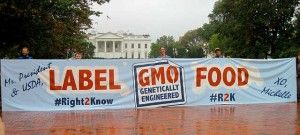Prop 37: Right to know or right to sue?
By Dave Roberts
Proposition 37 has been touted as a simple measure that provides consumers with the right to know what is in the food they buy at grocery stores. It requires that all products containing ingredients that have been genetically modified be labeled as such. While it’s questionable whether that knowledge would actually make consumers safer, there’s little doubt it would make California courts busier.
“Proposition 37 would create a litigation nightmare, no doubt about it, for grocers, who would need to comply with all of its requirements,” said Ron Fong, president and CEO of the California Grocers Association, speaking at a joint legislative committee informational hearing on the measure. “The proposition, in our opinion, is not a right to know — it’s a right to sue. And when it comes time to sue, grocers and retailers will be on the front line, no doubt about it. As a colleague of mine put it, ‘When lawsuits are filed, lawyers might not be able to figure out where your Cheerios come from, but they sure as heck know where they bought it.’ And that’s us, the grocery retailers.
“Grocers would be responsible for a paper trail on every ingredient on every product that we sell. And that’s potentially hundreds of thousands of products requiring paperwork down to the seed level. The average 50,000 square-foot grocery store that you probably shop at on the weekends contains over 100,000 SKUs [stock-keeping units] in a variety of categories coming from different suppliers. It would not be a simple process to keep a simple trail of paperwork. Is it the retailer that keeps the paperwork? Is it the supplier that keeps the paperwork? The wholesaler? You have to keep the paperwork with each delivery. That’s going to amount to a nightmare of potential paperwork and record keeping.”
Fong predicted that Prop. 37 will result in a repeat of the lawsuit tsunami created by Proposition 65, the Safe Drinking Water and Toxic Enforcement Act of 1986. A multi-million-dollar industry sprang up for bounty-hunter lawyers preying on businesses, often on flimsy pretenses. To protect themselves, businesses had to put up those annoying signs: “WARNING: This area contains a chemical known to the State of California to cause cancer and birth defects or other reproductive harm.”
Grocers
“Grocery retailers have lived and learned from Proposition 65,” said Fong. “In the last two decades, Proposition 65 has been abused by lawyers seeking to shake down grocers into paying huge settlements that benefit only trial lawyers. Similar to Prop. 65, the food labeling proposition creates a new category of lawsuits allowing private citizens the right to sue claiming that a food company, a grocer or farmer has violated the labeling provisions. Like Proposition 65, the food labeling measure would require businesses to pay attorney fees and other legal costs incurred by the plaintiff’s lawyers.”
Fong argued that, if Prop. 37 was actually designed to help consumers, it would not contain so many exemptions.
“For example, soy milk requires a label, but cow’s milk does not,” he said. “Dairy products, eggs, meat and poultry are all exempt, even though those animals are fed genetically engineered grain. Dog food with meat requires a label, but meat for human consumption does not. Fruit juices require a label, but alcohol made with some of the same genetically engineered ingredients is exempt. Food in grocery stores you have to label, but the same foods in restaurants are exempt. If the proponents of 37 are so concerned with the right to know, why would they exempt so many of these categories? The reality is Prop. 37 is not a simple labeling measure. It’s filled with lawsuits, loopholes, increased costs for the consumers — and that’s the bottom line.”
Kent Bradford, a professor of plant science at UC Davis, pointed out that genetic engineering of crops with grafting and cross-breeding has been going on for hundreds if not thousands of years, with no adverse consequences to human health. In fact, the newer techniques are safer.
“We do many things to create new crops based on genetics,” he said. “We genetically modify them all the time based on techniques that we use in standard breeding techniques and other types of approaches. All modify the genetics of our plants in one way or another. That’s how we make progress. Today we have newer techniques. That is, we can be very targeted, very specific in what we’re trying to do. If we need to enhance just one trait, one property of a plant, we have the capability of doing that. This makes the process safer, not less safe.
“Foods produced from that, which the proponents of Proposition 37 want to put warning labels on, have in fact been eaten by trillions of servings. The vast majority of these foods are fed to animals. And we eat and utilize billions of farm animals every year. I think if there were really serious health issues, our livestock producers would have noticed that. The vast majority of corn and soybeans utilize these [genetically modified] products. And certainly we have no documented cases yet of any health issues to humans or animals due to genetically engineered foods.”
European Union
The European Union, which bans genetically engineered foods, has commissioned hundreds of studies, none of which show serious health or safety issues with those products, according to Bradford. But California’s regulations would be even stricter than the EU if Prop. 37 passes. It would require a 0.5 percent maximum for genetically modified content versus Europe’s 0.9 percent threshold. Such a low threshold would increase litigation liability because a fraction of the tests create false positives, Bradford said.
Ironically, the environment would actually be worse off by eliminating genetically engineered crops.
“Utilization of herbicide-tolerant crops has enabled conservation of tillage,” said Bradford. “We have farmers who don’t own ploughs anymore because they can control their weeds in other ways. This has many benefits on reducing soil erosion, enhancing organic matter in soil. In fact, hopefully sequestering carbon out of the air into soil if we stop plowing enough. This has been a huge benefit. We have used more of some certain herbicides. But we have replaced herbicides that have much greater impact on the environment. So the overall impact on herbicides has gone down considerably.
“Insecticides used in corn and cotton have been much more dramatically reduced. There’s no question on any side that we have reduced the use of those insecticides which are the ones that tend to have the most likelihood of collateral injury to humans and particularly to workers who are plowing in these fields. If we can reduce the application of these insecticides, we would really like to do that. And that has been done.
“Labeling requirements such as this, which would create pushback in the marketing stream for these types of crops, would certainly be a disincentive for further investment in genetically engineered crops, including those that are in the pipeline that would be targeting much more important traits such as drought tolerance, salinity tolerance, heat tolerance. Issues that are very, very important in California. Water use is a key issue in California. We have already approved the concept of these types of advances. They can be done using genetically engineered crops.
“So I just have to ask whether in fact this is a strategy as a society we should pursue to put additional hurdles, de facto warning labels, on a whole technology. This is not like saturated fat or calories. This is an entire technology not specific to the product that we are going to label foods for, I think it’s clear to say, with the clear intent to create fear and some concern in the consumer’s mind. That will have an impact on the market and investment in these scientific advances. And we are going to forego as a society advances that we need and that the global population needs. We need to feed 9 to 10 billion people in about 30 years. And we need these tools.”
Prop. 37 proponents don’t acknowledge that hurting the mainstream food industry in order to buck up the organic share of the market is one of the main goals of the measure. Instead, they couch their arguments in terms of transparency.
Arguments in favor of Prop. 37
“One of the great freedoms we have as Americans is the basic right to choose from a different variety of foods in the marketplace,” said Rebecca Spector, west coast director of the Center For Food Safety. “If we want to know if our food contains gluten, high fructose corn syrup, trans fats or MSG, we can simply read the label. This information has empowered millions of consumers to take control of what we eat and feed our families for health, religious, environmental or ethical reasons.
“However, these freedoms are being denied to the more than 90 percent of Americans who want to know if their food contains genetically engineered ingredients. The intention of Prop 37 is simple. It merely requires that foods that are produced using genetic engineering are labeled as such. The initiative is intended to provide California consumers with information about the foods they purchase that is currently hidden. Because more than 80 percent of all processed foods contain genetically engineered ingredients such as corn and soy.
“Unlike 50 other countries, including European Union member states, Japan, Brazil, Russia and China, the U.S. has no law requiring labeling of genetically engineered foods. As a consequence, millions of consumers are unknowingly purchasing and consuming genetically engineered foods every day, despite the fact that the U.S. Food and Drug Administration does no independent testing of the safety. In fact, documents that we uncovered in our previous litigation against the agency showed that scientists within FDA have indicated that genetically engineered foods could pose serious health risks.”
Spector suggested that the FDA has failed to crack down on genetic engineering because it is in the pocket of the pesticide industry.
It appears that Californians might not be ready to go organic. An Oct. 28 California Business Roundtable/Pepperdine poll shows 39 percent support with 50 percent opposed. An Oct. 21 Los Angeles Time poll shows 44 percent support and 42 percent opposed.
Related Articles
Will failed Prop. 209 rollback help GOP with Asian voters? It depends
With Asian-Americans making up 14 percent of the state’s electorate, there is a small but real chance that this past
Winner Emken launches pointless campaign
June 6, 2012 By John Seiler When I fired up the Drudge Report this morning, the first ad on the
California voters OK 63% of tax measures
June 8, 2012 By Chriss Street Local voters approved 63 percent — or 55 of the 87 — local tax,




